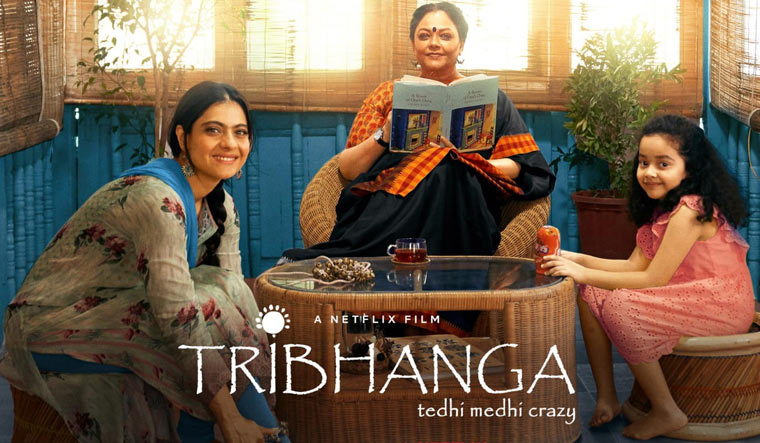Netflix Original Tribhanga: Tedhi Medhi Crazy (2021) is actor Renuka Shahane’s directorial debut in Hindi. The story revolves around the lives of three generations of women in a family. It highlights how each of them makes unconventional decisions pertaining to their professional and private lives which inadvertently affect their dear ones in various ways.
In the film, Tanvi Azmi plays Nayantara ‘Nayan’ Apte, an accomplished writer who with the help of a student of hers, Milan (Kunaal Roy Kapoor), is writing her autobiography, or rather recording it, as she suffers from arthritis and cannot physically write. Anuradha ‘Anu’ Apte (Kajol), an established Odissi dancer, is Nayan’s daughter, and Masha’s (Mithila Palkar) mother.
The plot encompasses what transpires after Nayan slips into a coma. Other than the conversations at the hospital, flashbacks and Nayan’s video clips reveal most of the story. Viewers learn about the troubled relationship between Anu and her mother which stems from a history of sexual assault at the hands of her step father unbeknownst to Nayan.
Later in the film, in a similar note, Masha also reveals how she was bullied for most of her life on account of Anu’s personal choices. This in turn makes her choose a life of subservience in an orthodox family, it is her ‘choice’ nevertheless, to willingly let go of the very freedom Nayan and Anu had obstinately fought for and exercised. The freedom to follow one’s dream and live with a partner of their choice regardless of society’s skepticism.
Shahane tries to exemplify female bonding, but restricts herself to the more common trope of troubled mother-daughter relationships. However, it is the easy resolution that comes off as a little removed from reality. A very similar plotline can be observed in the biopic Shakuntala Devi (2020) as well. Even an article in Firstpost points this out.
In both the films the children; daughters, are portrayed as victims of broken marriages, how separated or divorced parents impact their lives. While more projects on this topic could normalize it, at times they tend to not break the traditional notion of a family but project it as ‘normal’.
Jane the Virgin is an American telenovela that could be a good example of tracing the relationships between three different generations of women within a family, quite like in Tribhanga, but more nuanced. Definitely, the long form narrative structure of the 5-season long show is an advantage. All 100 episodes are streaming on Netflix.
‘Tribhanga’ is a posture in dance forms like Odissi where the artist’s body; knees, hips, neck and shoulder, is bent in three directions. This signifies the ‘tedhi, medhi, crazy’ characteristics.


